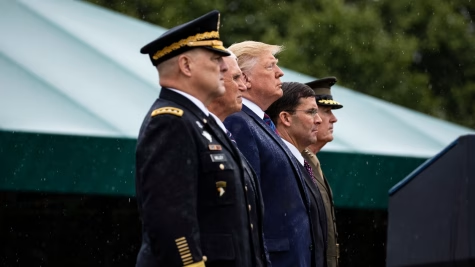
Washington D.C. on Edge Over Trump’s Return
No wonder Washington D.C. is on edge about Donald Trump’s return. His transition team is pushing forward with a serious investigation into the chaotic U.S. withdrawal from Afghanistan, raising eyebrows about the possibility of court-martials for military officers involved in the operation. According to sources familiar with the matter, the team is compiling a list of both current and former U.S. military officers who played a role in the 2021 exit, exploring the legal ramifications of their actions.
Trump’s Efforts to Hold Military Leaders Accountable
The Trump transition team is not mincing words. A U.S. official confirmed to NBC News that the team is considering a full-scale investigation into how the withdrawal was executed, especially targeting military leaders who made critical decisions. The team is reportedly looking into whether those involved could face serious charges, including the rare and severe charge of treason.
“They’re taking it very seriously,” one source said about the investigation. The team’s focus appears to be twofold: first, to review how the U.S. entered the war in Afghanistan, and second, to hold individuals accountable for the bungled exit.
While former Trump officials have been vocal about their criticism of the withdrawal, it remains unclear whether any legal actions—such as charges of treason—would hold up in court. After all, these military leaders were following orders from President Joe Biden to execute the full withdrawal.
Matt Flynn’s Role and the Legal Question
A key figure in the Trump transition team is Matt Flynn, former Deputy Assistant Secretary of Defense. While Flynn’s involvement in this investigation has sparked controversy, it’s important to note that his attorney has denied any role in leading such a review. Mark S. Zaid, Flynn’s lawyer, firmly stated, “Matt Flynn has nothing to do with the Trump transition team, much less leading any review concerning military justice matters.”
Despite the ambiguity surrounding Flynn’s role, the transition team is exploring all avenues to hold military leadership accountable, perhaps aiming for a symbolic “set an example” approach rather than specific charges like treason.
Trump’s Damning Critique of the Withdrawal
Trump has never been shy about calling the Afghanistan withdrawal a “humiliation” for the United States. He has slammed the decision as “the most embarrassing day in the history of our country.” It’s clear that Trump sees the withdrawal as a defining moment in both his presidency and America’s military legacy.
In fact, Trump’s former pick for Defense Secretary, Fox News commentator Pete Hegseth, has been particularly vocal in his criticism of the withdrawal. Hegseth has called it a “humiliating retreat” and accused military leaders of failure, even calling for a radical overhaul of Pentagon leadership in his book The War on Warriors.
“These generals lied. They mismanaged. They violated their oath. They failed,” Hegseth wrote. “They disgraced our troops, and our nation. They got people killed, unnecessarily.”
The Chaos of the Withdrawal and Its Fallout
The 2021 Afghanistan pullout is still a sore spot in U.S. history. The images of Afghan civilians clinging to U.S. military planes, and the subsequent Taliban takeover, are indelibly etched in the collective memory. Not to mention the deadly bombing at Abbey Gate that killed 13 U.S. service members and nearly 170 Afghan civilians.
Trump’s team seems determined to make sure no one is shielded from responsibility for the fallout of the withdrawal. The transition team is considering recalling several military leaders to active duty for questioning, with some sources claiming this could lead to charges. Although it’s not yet clear what form these charges might take, the intent seems to be one of accountability and making an example out of those involved.
The Larger Implications: A Political Gamble?
In his upcoming presidential run, Trump is positioning himself as a critic of the current U.S. military leadership. He has made it clear that he believes his first administration made mistakes, including appointing too many “Democratic generals.” This investigation into Afghanistan may serve both as a political statement and a tactic to rally his base.
As Howard Lutnick, one of Trump’s advisers, noted, the former president has learned from his first term, vowing not to repeat the same mistakes with his military appointments. Whether this investigation is a genuine push for accountability or a political strategy remains to be seen.
For now, Washington will continue to watch closely as Trump’s team works to hold military leaders accountable for one of the most controversial episodes in U.S. foreign policy in recent memory.
